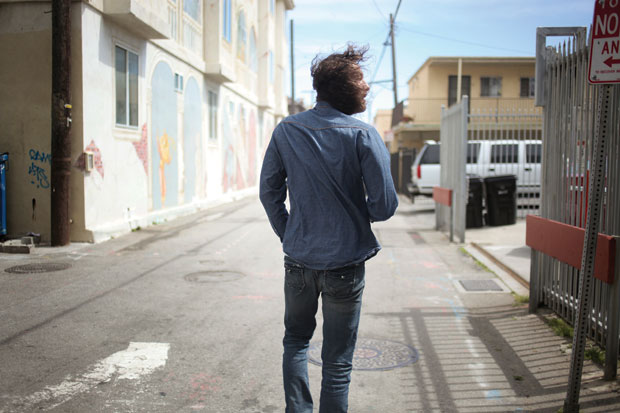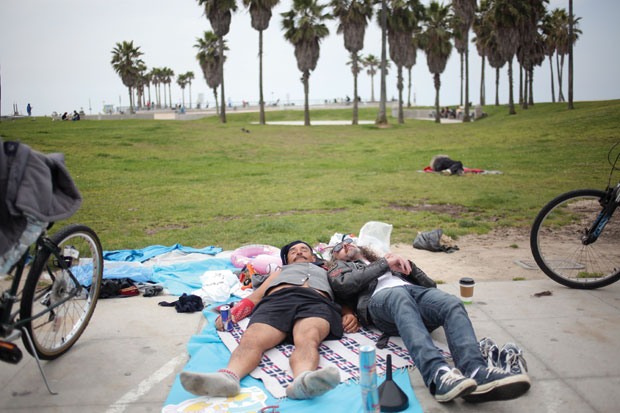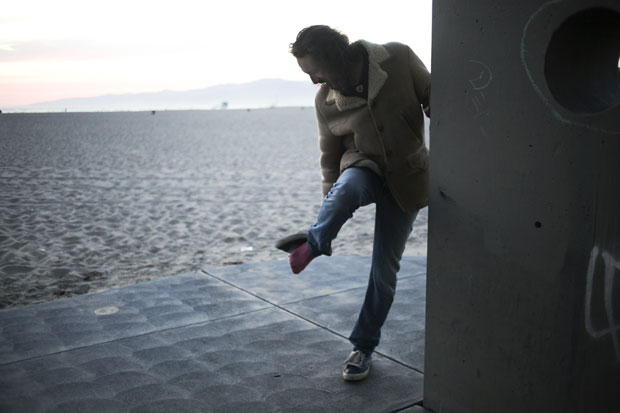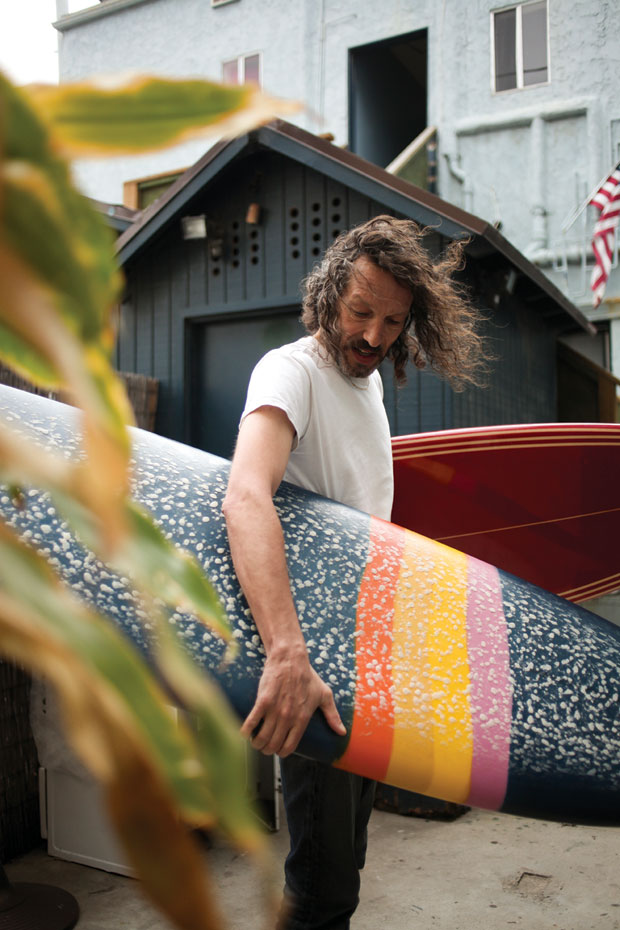Living proof that good times are all you need to sustain a great life, DJ Harvey is cresting the wave of his legendary career into an endlessly golden sunset.
"I think I’m supposed to be having a midlife crisis, you know? I’ve got the fast motorcycle and the young girlfriend, I’m considering buying a speedboat, my hair’s getting bigger and bigger. But I don’t feel old mentally in any way, shape or form,” Harvey Bassett explains surveying the Venice Beach boardwalk, sunglasses parked on the bridge of his nose. His right pinky fingernail is painted baby blue, but it’s chipping. “I feel innocent and positive and excited.”
It’s another sunny day in Venice, California, one of approximately 300 per year, and why shouldn’t this man feel golden? He’s arrived to our 3PM breakfast appointment via skateboard—not itself unusual for a 49-year-old gentleman of this zip code—and, over eggs and Coronas and Marlboro Reds overlooking the beach, graciously fulfills his obligation for the day, which is to lend colorful commentary to a highlight reel of his professional triumphs. Not a bad gig for a Wednesday. From time to time, fellow Venetians passing by on the boardwalk greet him with a salute and a shout. “This is as far west as you get, this is the edge of Babylon,” he says, nodding toward the ocean, or perhaps the pansexual New Age moppets gliding by on rollerblades. “It’s all gonna snap off and slide into the Pacific at some point and take us all with it. Cheers to that.” We clink bottles. In this town, where he’s been surfing off hangovers since flying over from London on the post–9/11 cheap seats and overstaying his visa, Harvey Bassett—better known to the masses as DJ Harvey, pioneer of the re-edit, master of the eight-hour set—seems to have it made.

Of course, you may never have heard of him. Few people outside the discrete subculture of dance music have. But for the past 35 years of his Zelig-like career, Harvey has shown an uncanny knack for stumbling into all the interesting rooms at all the right moments, a result of socializing for a living and a near pathological pursuit of adventure (not coincidentally, his favorite stories are about pirates and Vikings and old-timey gentlemen explorers; he’s recently finished one about the cannibal sailors of the whaling ship Essex). “I’ve done most of the life-threatening things I’ve wanted to do,” he says. There’s no dark secret thing I’ve thought I might like and haven’t tried. You know how Scientologists grab onto that machine and get you to confess? I’ve decided you couldn’t get me with one of those, because I have no guilt. I’ve deeply looked into myself, and I have no guilt.” Presumably, then, it’s just the sunshine that keeps Harvey’s sunglasses on throughout our first meeting. He has never sent an email and doesn’t drive a car. His nimbus of brown curls is like a child’s, and when he laughs, which is often, the battle scars on his face from decades of late nights and cigarettes crinkle into familiar positions of joy. Everything essential to Harvey’s life can be found within a few blocks of here: his kid, the apartment he shares with his girl, his friends, the studio, the beach. “I haven’t had to sweat it for so long, I think sweating it might be beyond me,” he says at one point. But all this emphatic grooviness is hard to corroborate when the man hasn’t even shown his eyes yet. If it’s not bogus, what conspiracy of nature and nurture could possibly create such a specimen?
When Harvey was growing up in England in the late ’70s, punk and disco were ascendant, born out of a wobbly political climate and thriving youth culture. At age 14, he was already making the scene, drumming for a group called Ersatz, getting spins on John Peel and being babied by his twenty-something bandmates’ girlfriends. His hometown of Cambridge is a proper university city, but Harvey didn’t need to matriculate to get an education. He stole records from the university libraries, crashed its fancypants May Balls, sneaked into art classes and lectures and jammed in the orchestra pit with his friends. In interviews, Harvey’s fond of crediting this youthful swagger to the atom bomb, or at least its cultural fallout. “That was the big bang that kicked off youth culture as we know it, the beginning of my culture,” he says. “Suddenly kids had disposable incomes, you could be stylish and listen to rock and roll.” His was the generation that defined what we now consider to be the rites of adolescence. “By the time the ’70s rolled around, I was influenced by all of it: punk rock, oil embargos, change of government, disco, the important things.”

The commingling of punk and disco isn’t as loopy as it sounds; if punk was partly about defiance and subversion, professing love for the supposedly superficial genre was about as punk as you could get. At the turn of the decade, proto-rap from the likes of Spoonie Gee and Bobby Broom started percolating from the States. The way Harvey sees it, hip-hop culture owes a debt of gratitude to disco, a fact he feels is overlooked to this day: “By the way, boys and girls, hip-hop comes from disco, that’s why it’s called disco breaks—the original hip-hop record is done over a Chic riff, not a fucking Lost Poets riff. Get with the program, children! Watch 80 Blocks from Tiffany’s and get educated.”
Bewitched by these new American sounds, Harvey and a friend flew to New York in 1985 in search of hip-hop, their one-way tickets financed by the friend’s inheritance from his father’s death in a slaughterhouse accident. It was Harvey’s first visit to America. “We slept in Washington Square Park, we hung with the Rocksteady Crew, we walked up Manhattan to Soundview Park in the Bronx, we went dancing at Studio 54 and Jellybean was DJing, we hung with the Fat Boys at the Roxy, we went painting trains in the layups with Mare and Seen, all that.” And the trip was not without debauchery. “The crack cocaine blew my mind,” he says. “And they thought we were rich and took everything we owned, so we took everything they owned…oh, it got ugly.” Too broke for a plane ticket back to England, Harvey hopped a bus to California instead, crashing with an ex-girlfriend’s family and gardening the gilded landscapes of Palo Alto—his first taste of the California voodoo—until he could afford to fly home.
Back in the overcast UK and still under the influence of the New York scene, Harvey invested in laceless Adidas and a Kangol and began cutting up breaks and teaching himself the basics of DJing. For the next several years, he perfected and experimented with the practice as part of the Tone Def Krew (or TDK), later known as Tonka, a collective of DJs that operated mostly independent of the thuggish world of mainstream clubs and promoters. Tonka’s free all-night parties on beaches and in warehouses, as well as a monthly night at the Zap in Brighton, placed hip-hop and disco alongside the emerging house, techno and blissed-out Balearic sounds that defined the scene’s golden age, before the Criminal Justice Act of 1994 clamped down hard on rave culture.
For Harvey, what followed in the next decade and a half was general decadence, a blur of parties and residencies all over the world, and the occasional pause for a cheeky side project. In the early ’90s, his series of edits with Gerry Rooney under the Black Cock label achieved cult status and led to gigs producing and remixing for bands like The Police and LCD Soundsystem. Later, he and fellow Tonka alum Thomas Bullock formed Map of Africa—allegedly named for the damp silhouette your junk leaves on the sheets after acts of sexual congress—and wrote a scuzzy classic-rock record that pays tribute to the heroes of their youth, including Motorhead, Deep Purple and Pentangle. Mostly, though, Harvey has spent the past 20 years in the booth, cementing a reputation as a man to whom you could and should entrust your night, if not your drugs and your daughters.

One person who is most definitely not swayed by all this hard-earned cred is his 18-year-old son, Harley, proof that all teenagers think their parents are egregious dorks. “He came up to me recently and said, ‘Your music’s gay,’” says Harvey. “I said, ‘Son, you wouldn’t know gay if it jammed its fist up your rear. I told him, ‘You can’t understand the blues until you’ve had your heart broken, and you can’t understand disco until you’ve had group sex on Ecstasy.’” Harley lives with his mother, Heidi Lawden, Harvey’s ex and current manager, whom he met in London, where they threw a popular club night called Moist. If Harvey doesn’t appear to be sweating things, a big chunk of the credit goes to Heidi, who handles all of the details of his career that he can’t be bothered with. Sometimes it almost seems like she has two children. “Me and Heidi have a fantastic relationship, and I get to see a lot of Harley,” says Harvey, who shows surprisingly classic Dad tendencies. “The worst thing I could possibly do if he’s chilling in his room with his boys is threaten to come in and do a silly dance,” says Harvey. Heidi is also friendly with Sam, Harvey’s current girlfriend, not to be confused with the woman to whom he’s currently married (aloha, green card), who’s in Hawaii at the moment. Basically, just smile and imagine Big Love, but set in Venice and minus the polygamy, religion and Harry Dean Stanton.
Thursday evening at the Mophonics studio in Venice, Harvey rolls up to remix a Bjørn Torske track with his engineer, Josh Marcy. The pair also collaborated on a new release, Locussolus, a return to classic Harvey form: an upbeat, danceable A-side and a slightly freakier B-side. Before getting to work, Harvey strums an electric sitar and talks the basics of DJing. In contrast to his laid back approach to life, this is clearly a serious discipline. Nothing he does in a set is random. And there are rules: he never plays two female vocalists back to back (because one will outshine the other) or a lyric he doesn’t believe in. Volume and tempo are tools of the trade, and 120BPM is the magic number for inducing a trance state. “I haven’t managed to take it into the laboratory but I have had dance floors where I’ve seen the difference between 110, which is sort of sleaze-boogie tempo, more of a rolling groove, and 120, which is more of a head-nodder. 130, 135’s different—that’s techno orgy energy, before it slips into a junglesque or happy hardcore realm.” He sees the cycles on the dance floor as having a strong basis in the natural world. “The earth goes around the sun every 24 hours. It’s a very slow boom, but it’s a boom. And you speed up that stuff and start to deal with earthquakes, weather patterns, patterns of volcanic eruption, rhythms of life, seasons, rebirth. You get into the rise and fall of empires,” he says. “I’m not lying in bed awake thinking about it, but it’s something I realize exists and I play with a little.” When he brings up the brown note, the low frequency that allegedly makes you crap yourself, it’s an unsettling reminder that DJs also have the potential to inflict harm as well as highs.
Harvey’s ongoing claim to fame is Sarcastic Disco, a serialized private party in LA that stakes its reputation on good vibes and Harvey’s epic 11PM to 7AM sets, which are exercises in stamina. “Sometimes people will walk up to me and start a conversation and I’ll have to say, ‘I’m dreadfully sorry, it might just look like I’m standing here being really fucking cool, but I’m working so goddamn hard right now you have no idea. I’m concentrating on the two records that I’m playing at this present moment, and you’re talking in my ear because they’re playing together so well you don’t even realize they’re playing together,’” he says. “So I’m holding that down, right, and I’m trying to think what the next record is gonna be, and all this stuff is going around me, and I’m gonna be doing this for the next seven or eight hours, basically I’m in a state of virtual panic for eight hours at a time, plus I dance all that time, too, bobbing up and down, moving around, and I’m throwing some Jack Daniels back and smoking a whole pack of Marlboros—yeah, it can get quite intense.”

As if to illustrate the point, when we meet up to go record shopping, Harvey can’t remember the name of the club he played in San Francisco last night. “Another day, another disco,” he shrugs. At Record Surplus on Pico, he speed-fingers through the bins like a mad librarian, pulling selections. He’s a connoisseur of important things, like the ’60s meditation record in psychedelic packaging he’s just found, or the Casio SK-1 keyboard he scavenged last week from the Venice alleyway garbage. A pair of Altec Santiago speakers were another dumpster find. Harvey’s still on the prowl for his personal white whale of discarded treasures, one of the large-installation sound systems used in movie theaters during the ’40s and ’50s. It could happen, though, and he knows how. “Imagine this,” he says. “A basketball player decides to buy Douglas Fairbanks Jr.’s old house in Beverly Hills. As he goes into the old screening room, he and his interior designer are like, ‘We have to get this big ancient crap out of here and put in a state-of-the-art liquid quartz fucking screen, and little speakers that you can’t even see, and we’re gonna throw all this old stuff in the trash.’ What they’re doing is throwing away the most beautiful in-home Western Electric or RCA system from the early ’20s. And literally, you can find that stuff in the trash. That’s why my eyes are always watching the sidewalks.”
The weekend after Coachella, the initiated flock to an unmarked warehouse outside of downtown L.A., ready to dance until dawn. At midnight, there’s already a line forming. Inside, the softest of softcore Euro porn is projected on the wall, and disco-ball strobe provides fine needles of light in the otherwise browned-out space. The scene on the dance floor feels sweetly democratic: college chicks in vintage prom dresses and too-big heels clutching plastic cups of Bacardi, bespectacled beardos, androgynous waifs with architectural hair. Harvey’s presence is heard but not seen; he’s tucked in an anonymous corner but hard to make out in the haze. Earlier, he explained why his standard for Sarcastic is so high. “Maybe in another disco or another club where I haven’t been before, I can’t be fully responsible for every factor,” he’d said. “But when it’s Sarcastic Disco, I feel personally responsible for the physical, mental and metaphysical welfare of everybody in there. You have everyone’s night you’re responsible for. You fuck up and people are pissed off. It’s on my shoulders and I don’t take that lightly.” Some people take responsibility for their mortgages or their health; others, for a crowd of anonymous partygoers. The volume starts loud and gets louder around two, when overflow from the shuttering bars arrives en masse. People are smoking and drinking and kissing and dancing, oblivious to the parking tickets, day jobs and bad skin that harshes their daylight hours. Nobody’s looking at you here, in the best possible way. Late in the night, a cop car pulls up with flashing yellows, but after a brief powwow with security, drives on by. Sometimes even the law can’t argue with good clean fun.

